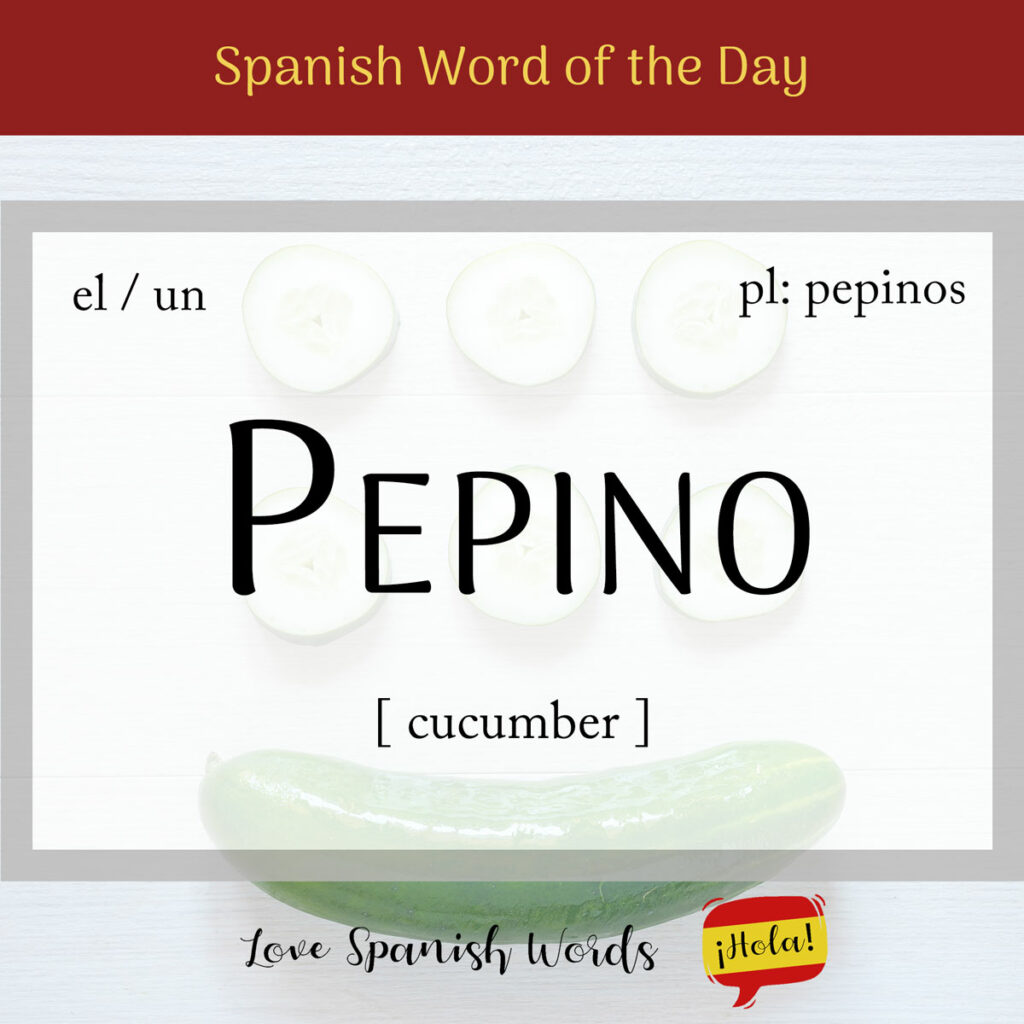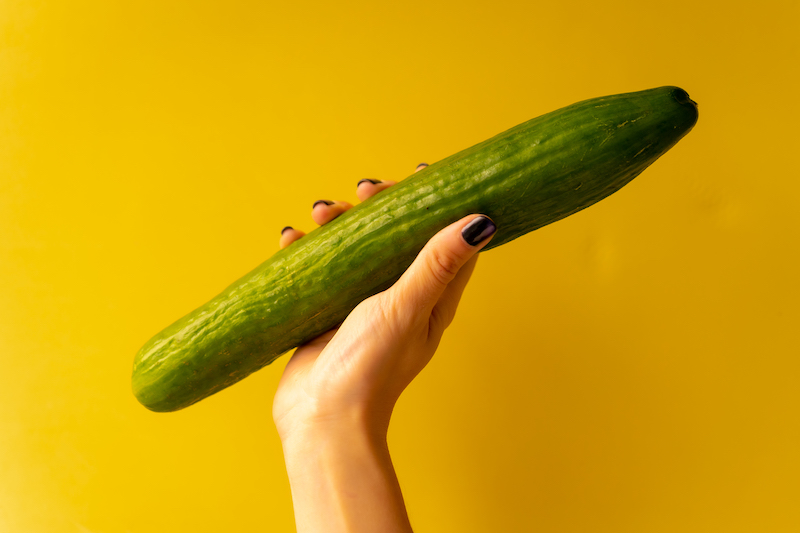Pepino, which means cucumber in English, originates from the Latin word pepo and the Greek word pépon, both of which refer to large, juicy, mature fruits like melons. Over time, this term became specifically associated with the Cucumis sativus plant that produces cucumbers.
Latin American Pronunciation
European Pronunciation

Pepino is a masculine noun that takes the following definite and indefinite articles:
- el pepino = the cucumber
- los pepinos = the cucumbers
- un pepino = a cucumber
- unos pepinos = some cucumber
Me gusta comer pepino con sal y limón.
I like to eat cucumber with salt and lemon.
The pepino originates from an Asian plant, but it is now cultivated worldwide. Known for their health benefits, cucumbers are packed with water to keep you hidratado (hydrated) and are bajos en calorías (low in calories). They also contain essential vitaminas (vitamins) that promote bone health and maintain healthy skin.

Fun Facts:
Pepinos were first cultivados (cultivated) in India over 3,000 years ago. Later, they became popular in ancient civilizations like Rome, Greece, and Egypt.
Pepinos are widely used in many productos de belleza (beauty products) due to their numerous benefits. Freshly cut pepino slices help reduce hinchazón (puffiness), swelling around the eyes, and ojeras (dark circles). Their vitamins aid in rejuvenecimiento de piel (skin rejuvenation), tightening and firming the skin to diminish the appearance of arrugas (wrinkles) and líneas finas (fine lines). Additionally, their antioxidantes (antioxidants) help reduce inflammation and soothe the skin.

Fun Facts:
Pepinos are composed of around 95% water, making them hydrating snacks. They are also bajos en calorías (low in calories), with only 16 calories per cup. This makes them the perfect weight-loss food.
Pepinos can be enjoyed in various ways. They are often eaten freshly cut into slices and added to ensaladas (salads). They are also commonly included in sandwiches or cut into thin sticks for dipping into sauces like hummus and sour cream. Another popular way to enjoy them is as pepinillos (pickles).
Although pepinos are considered vegetales (vegetables), botanically they are classified as frutas (fruits) because they contain seeds that come and develop from the cucumber flower plant.
Here are some words that use pepino:
- pepino dulce = sweet cucumber
- encurtido de pepino = pickled cucumber
- pepino japonés = Japanese cucumber
- mascarilla de pepino = cucumber mask
- sándwich pepino = cucumber sandwich
- agua de pepino = cucumber water
- ensalada de pepino = cucumber salad
- rodajas de pepino = cucumber slices
- pepinillo = pickle
Mi hermana pone pepino en su agua para darle un sabor fresco.
My sister puts cucumber in her water to give it a fresh taste.
Interestingly, pepinos can be used as a repelente de insectos (bug deterrent) and for eliminación de olores (odour removal). If you rub a cucumber on a surface, it helps eliminate odours – perfect for use in the kitchen!
As bug deterrents, they can repel bugs such as cucarachas (cockroaches) and hormigas (ants). If you rub pepino slices wherever you have plagas (pests), it helps keep them away.

Spanish expressions featuring ‘pepino’
A common one is Me importa un pepino, which translates to I don’t care a cucumber but is the English equivalent of I don’t give a damn.
- No me importa un pepino lo que piensen los demás. (I don’t give a damn what others think.)
Another popular expression is No entiendo ni un pepino. It translates to I don’t understand a cucumber but it is the equivalent of I don’t understand a thing.
- No entiendo un pepino lo que esta enseñando el maestro. (I don’t understand a thing the teacher is teaching.)
The expression Me vale un pepino is similar to the first expression mentioned above, Me importa un pepino, which means I don’t give a damn. This phrase uses vale which is the present tense of the verb valer (value). You can also say Esto no vale un pepino. It translates to this is worth a pepino, but it means this is worth nothing.
- Su disculpa vale un pepino. (His apology is worth nothing.)
- Me vale un pepino lo que la gente diga de mi. (I don’t give a damn what people think of me.)
Spanish idioms featuring ‘pepino’
Ser mas fresco que un pepino
Literal translation: to be fresher than a cucumber
English meaning: to be shameless / insolent
Estar fresco como un pepino
Literal translation: to be fresh like a cucumber
English meaning: to be fresh or in good condition, especially after resting

